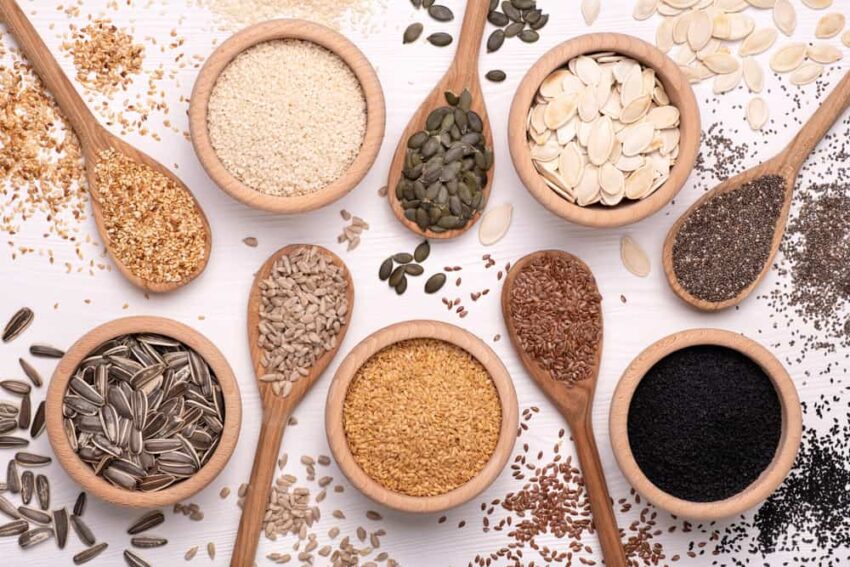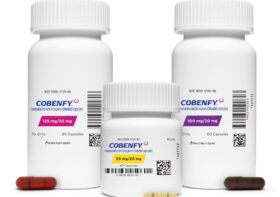Seeds and their Health Benefits


Pumpkin seeds may also be known as pepitas in the Spanish culture and even some places around the United States. These green gems are loaded with iron, zinc magnesium and contain several antioxidants like flavonoids and phenolic acids which can help to reduce inflammation in the body. Pumpkin seeds have been known to help reduce the risk of breast cancer in postmenopausal women and improve the reproductive health in men and women due to the high counts of zinc. Zinc helps improve fertility in women and the sperm quality in men. In addition to being an excellent source of vitamins, pumpkin seeds are also high in fiber which is essential for gut health. These seeds are great on top of yogurt, oatmeal or even mixed in with a salad.
Hemp seeds aren’t amongst the most common, but they do hold great benefits. These are often bought in a bag labeled as “hemp hearts” and have an oat-like look and feel to them. Hemp seeds are an excellent source of omega-3 and omega-6 fatty acids and are extremely rich in protein and fiber. In fact, hemp seeds provide all nine of the essential amino acids, therefore making it a complete protein! They are a great protein option for anyone who is vegan or vegetarian. Additionally, the CBD content in hemp seeds may be just enough to help protect humans against Parkinson’s, Alzheimer’s, multiple sclerosis and even childhood seizure disorders. CBD is also known as cannabidiol which is an active ingredient in the cannabis (hemp) plant but does not cause a high and is not addictive. Like the other seeds I have mentioned, hemp seeds are very rich in vitamins and minerals. These include magnesium, potassium, iron, zinc, and several b vitamins like niacin, riboflavin, thiamine, vitamin b-6 and folate which boost the seed’s ability to reduce inflammation and support the health of our bodies.
Chia seeds are like hemp seeds in that they also contain high amounts of omega-3 fatty acids but differ slightly in some of the other components. The fiber content in chia seeds is one of the highest and can very easily be over-consumed causing severe stomach upset. When consuming chia, it is important to ensure you are drinking plenty of water, perhaps more than normal because the chia will expand in your stomach and can cause discomfort. Chia seeds are great for improving gut health, reducing cholesterol levels and a great kickstart to weight loss because of the high fiber content.
Flax seeds can be found in both whole and ground forms, but consuming ground flax seeds is far more beneficial. When consuming whole flax seeds, you run the risk of them passing through your intestine undigested which can cause your body to miss all the benefits these seeds can provide. Like most others I have mentioned, flax seeds provide great sources of omega-3’s, fiber, B-vitamins like vitamin b6 and thiamine, as well as several minerals like zinc, magnesium, and iron. Thiamine plays a huge role in carbohydrate (energy) metabolism and cell function, both key components to our daily living. Flax seeds can be easily added into smoothies, oatmeal and even cookies as they don’t have much flavor but sure pack the punch with benefits!
Sesame seeds are great for someone looking to lower their cholesterol levels, blood pressure, and even reduce their overall inflammation. These seeds come in hulled and un-hulled options. As with most foods, consuming it as it comes will offer the most benefits than consuming it after it’s been processed and broken down in factories. An un-hulled sesame seed provides an excellent source of calcium which is crucial for our bone health, especially as we age. In addition to providing excellent source of calcium, this seed is very high in antioxidants which is great for immune health, and with its source of magnesium, zinc, and thiamine, it may also aid in hormonal balance during menopause and regular menstrual cycles.
Poppy seeds aren’t quite as beneficial as the seeds mentioned above, but they do hold enough to make them worth eating. Poppy seeds contain a high source of manganese which is essential in blood clotting and bone health. Manganese also helps the body utilize amino acids, fats, and carbohydrates by assisting the enzymes that are involved with these pathways. Alongside manganese, these seeds come with an excellent source of copper which is used by our bodies to make connective tissue and transport iron. Poppy seeds are on the lower end of fiber content but are still great additions to breads, muffins, or your favorite dinner dish.
The post Seeds and their Health Benefits appeared first on Total Gym Pulse.


